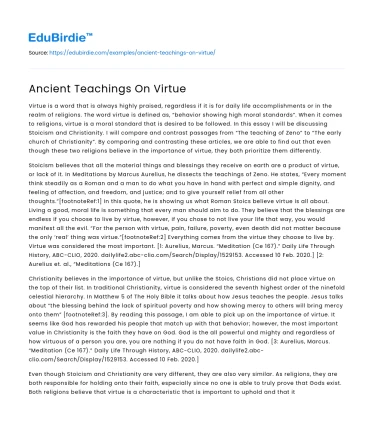Virtue is a word that is always highly praised, regardless if it is for daily life accomplishments or in the realm of religions. The word virtue is defined as, “behavior showing high moral standards”. When it comes to religions, virtue is a moral standard that is desired to be followed. In this essay I will be discussing Stoicism and Christianity. I will compare and contrast passages from “The teaching of Zeno” to “The early church of Christianity”. By comparing and contrasting these articles, we are able to find out that even though these two religions believe in the importance of virtue, they both prioritize them differently.
Stoicism believes that all the material things and blessings they receive on earth are a product of virtue, or lack of it. In Meditations by Marcus Aurelius, he dissects the teachings of Zeno. He states, “Every moment think steadily as a Roman and a man to do what you have in hand with perfect and simple dignity, and feeling of affection, and freedom, and justice; and to give yourself relief from all other thoughts.”[footnoteRef:1] In this quote, he is showing us what Roman Stoics believe virtue is all about. Living a good, moral life is something that every man should aim to do. They believe that the blessings are endless if you choose to live by virtue, however, if you chose to not live your life that way, you would manifest all the evil. “For the person with virtue, pain, failure, poverty, even death did not matter because the only ‘real’ thing was virtue.”[footnoteRef:2] Everything comes from the virtue they choose to live by. Virtue was considered the most important. [1: Aurelius, Marcus. “Meditation (Ce 167).” Daily Life Through History, ABC-CLIO, 2020. dailylife2.abc-clio.com/Search/Display/1529153. Accessed 10 Feb. 2020.] [2: Aurelius et. al., “Meditations (Ce 167).]
Save your time!
We can take care of your essay
- Proper editing and formatting
- Free revision, title page, and bibliography
- Flexible prices and money-back guarantee
Christianity believes in the importance of virtue, but unlike the Stoics, Christians did not place virtue on the top of their list. In traditional Christianity, virtue is considered the seventh highest order of the ninefold celestial hierarchy. In Matthew 5 of The Holy Bible it talks about how Jesus teaches the people. Jesus talks about “the blessing behind the lack of spiritual poverty and how showing mercy to others will bring mercy onto them” [footnoteRef:3]. By reading this passage, I am able to pick up on the importance of virtue. It seems like God has rewarded his people that match up with that behavior; however, the most important value in Christianity is the faith they have on God. God is the all powerful and mighty and regardless of how virtuous of a person you are, you are nothing if you do not have faith in God. [3: Aurelius, Marcus. “Meditation (Ce 167).” Daily Life Through History, ABC-CLIO, 2020. dailylife2.abc-clio.com/Search/Display/1529153. Accessed 10 Feb. 2020.]
Even though Stoicism and Christianity are very different, they are also very similar. As religions, they are both responsible for holding onto their faith, especially since no one is able to truly prove that Gods exist. Both religions believe that virtue is a characteristic that is important to uphold and that it is important to just be a good person. We live in a world where perfection does not exist and we have to constantly go through our ups and downs in order to learn from our experiences. Stoicism and Christianity both know that these lessons make us better everyday and that allows the difference in philosophy to connect at a deeper level.
Like I stated above, both Stoicism and Christians are aware that perfection does not exist. Christians know that they are capable of sin and when that happens they are responsible for prayer and asking for forgiveness. In an apology letter, it states, “you have the most notable example of judgment to come when anyone has sinned so grievously as to require his severance from us in prayer, in the congregation and in all sacred intercourse.”[footnoteRef:4] This letter states that if Christians are having a guilty conscience, all they need to do is pray. Stoics, on the other hand, believe that their wicked virtue just brings troubles to their human existence and that they just have to deal with it one day at a time. [4: “What were Early Christians like?” Christianity. (April 28, 2010). www.christianity.com/church/church-history/timeline/1-300/ ]
Virtue is of huge importance in both Stoicism and in Christianity, yet both regard it differently. They both believe morals of high standard are important but are placed at different levels when it comes to the scale of importance. Stoics believe that virtue manifests abundance and success on earth, while Christians believe that virtue is important but God is the most important. Living a Jesus like life is a reflection of the love of Christ you have in your heart. At the end of the day, both religions allow everyone to live a wonderful virtuous life filled with love and faith.
Bibliography
- Aurelius, Marcus. “Meditation (Ce 167).” Daily Life Through History, ABC-CLIO, 2020. dailylife2.abc-clio.com/Search/Display/1529153. Accessed 10 Feb. 2020.
- “Matthew 5.” The Holy Bible, 2005, NLT. (1095-1100).
- “What were Early Christians like?” Christianity. (April 28, 2010). www.christianity.com/church/church-history/timeline/1-300/ Accessed 10 Feb. 2020.






 Stuck on your essay?
Stuck on your essay?

